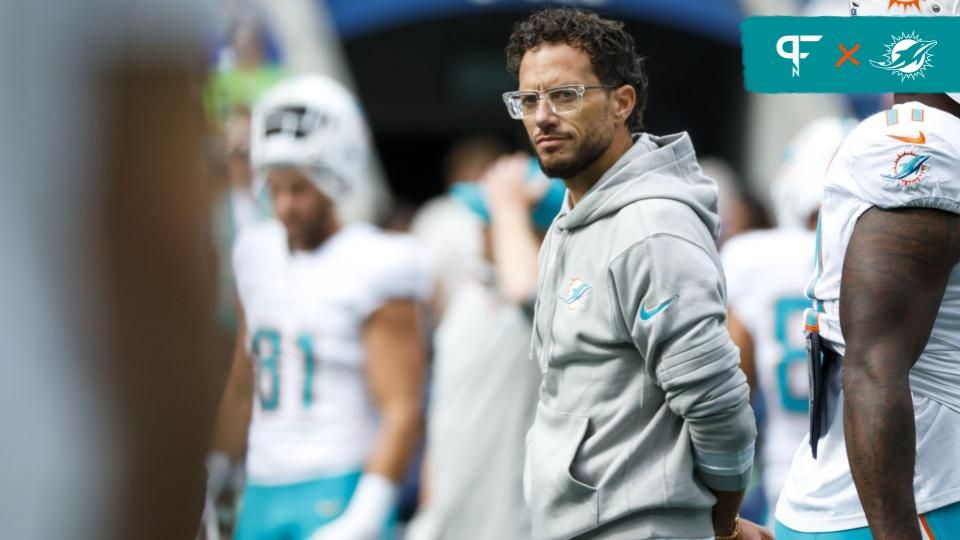MIAMI GARDENS, Fla. — If the new ideas aren’t working, it’s time to bring back some old ones.
At this point, what do Mike McDaniel and the Miami Dolphins have to lose?
It literally cannot get any worse on offense.
Can Mike McDaniel’s Miami Dolphins Offense Be Fixed?
The Dolphins after Week 4 are last in scoring (11.3 points per game) and EPA per play (-.258). They’re bottom-six in yards per play (4.6), yards per run (3.7), first downs per game (16), fourth-down efficiency (15.4%), red zone efficiency (33.3%), and goal-to-go (50%).
McDaniel is stuck and needs a lifeline.
He should phone a friend — or in his case, a mentor. It’s time to call the godfather of modern offenses, Mike Shanahan, for some fresh ideas.
Our guess? Shanahan will tell McDaniel to get back to the basics of a scheme that’s been widely successful for the past three decades.
“Everything is on the table,” McDaniel told reporters late Monday after yet another no-show by his offense. “You can’t argue the offense is good. To me in a situation like this, I hadn’t really been in one where we haven’t had production consecutively like this so you really have to open your mind to really all things.”
There are many reasons the Dolphins have the NFL’s worst offense, beginning with the quarterback position. But even before Tua Tagovailoa got hurt, there were warning signs.
Dating back to last year, teams had largely figured out how to neutralize Miami’s big plays, which were basically the entire offense. McDaniel hasn’t adjusted. If anything, he’s doubled down.
The Dolphins have thrown basically half as many passes out of play-action as they have without a play fake this year, despite the former being nearly twice as efficient as the latter.
Miami’s four quarterbacks this season have completed 28 of 48 attempts (66.7%) for 352 yards, one touchdown, and one interception off of play-action (with a 93.1 passer rating).
Further, 15 of their 35 passing first downs have come after play fakes, despite having 40 more passing attempts this year without play-action.
Mike McDaniel: Major changes needed on offense pic.twitter.com/efarYDHnRT
— Adam Beasley (@AdamHBeasley) October 1, 2024
When they don’t fake a run first, Dolphins QBs are averaging just 5.3 yards per pass and have completed just 61.4% of their attempts.
And even the play-action concepts Miami uses could use a bit more imagination.
Page 1 of the Mike Shanahan playbook was the bootleg, when the offense fakes an outside zone run one way, and the quarterback rolls back the other, often finding wide-open receivers because the opposing defense over-commits to stop the run.
If there was ever a time for McDaniel to bring that largely abandoned concept back, it was Monday with mobile QB Snoop Huntley under center. But McDaniel didn’t use it.
A possible reason why? McDaniel seems allergic to throwing from under center. The Dolphins, per TruMedia, have done so just five times all year — the third-fewest such attempts in the league.
Going under center opens up so many more possibilities on offense, but a staggering 96% of Miami’s dropbacks this year have been out of shotgun.
The Dolphins ran out of the I formation Monday night, with varied success. It’s time for them to pass out of it as well.
“It’s a performance-based industry,” said Dolphins fullback Alec Ingold. “I think every man here has a job we have to execute. The quarterback is obviously a very important piece of that puzzle, but we need 10 other guys to be performing and executing. It’s a performance-based business that we’re all a part of, so I think it’s more than fair and I think that’s where you know we’re doing the same thing internally.
“And to shy away from that because you’re not getting the results I think is weak-minded and I think we have to we have to attack that; we have to lean into this uncomfortable moment to see what type of team we are and what type of human beings we are.”

